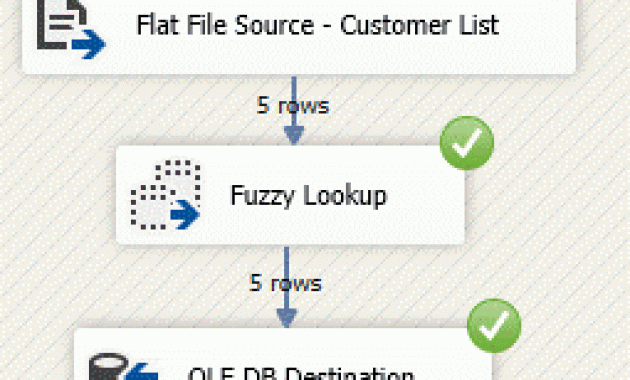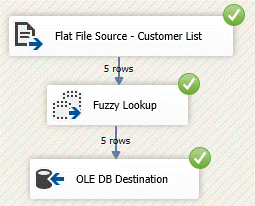
Unveiling the Power: Business Intelligence Tools for Fuzzy Matching
In the fast-paced world of data analysis, accuracy and efficiency are paramount. Businesses today grapple with vast amounts of information, often riddled with inconsistencies and errors. This is where the crucial role of Business Intelligence (BI) tools for fuzzy matching comes into play. These tools are not just helpful; they are essential for organizations seeking to unlock the true potential of their data.
Business Intelligence tools for fuzzy matching address the challenges of imperfect data. They identify and reconcile data entries that are similar but not exact matches. This is a critical capability, particularly when dealing with customer records, product catalogs, or financial transactions. The ability to accurately link related data, even with minor discrepancies, can significantly improve decision-making and operational efficiency.
The Core Concept of Fuzzy Matching
At its heart, fuzzy matching is a technique used to identify records that are likely to refer to the same entity, even if they don’t share identical values. This is achieved through algorithms that calculate the similarity between data entries. These algorithms consider various factors, such as spelling variations, typographical errors, and different formatting styles. Instead of requiring an exact match, fuzzy matching looks for the closest possible match based on a predefined similarity threshold.
Consider a scenario where a company has multiple customer records. Some records might have different names, addresses, or phone numbers due to human error or data entry inconsistencies. Business Intelligence tools for fuzzy matching can analyze these records, identify the similarities, and link them together. This process allows businesses to build a more complete and accurate view of their customers. Consequently, this leads to improved customer relationship management and targeted marketing campaigns.
Key Features of Effective Business Intelligence Tools
Choosing the right Business Intelligence tools for fuzzy matching is crucial. Several features distinguish effective tools from the rest. These features are fundamental to ensuring accurate and reliable data analysis.
- Advanced Algorithms: Robust tools employ sophisticated algorithms, such as the Levenshtein distance, Jaro-Winkler, or Soundex. These algorithms measure the similarity between strings of text. This allows the tools to accurately identify near matches.
- Data Cleansing Capabilities: Good tools offer built-in data cleansing capabilities. These features help to standardize and format data before the matching process. This includes removing special characters, correcting spelling errors, and handling missing values.
- Customization Options: Flexibility is key. The best tools allow users to customize the matching criteria and thresholds. This ensures the tool adapts to the specific needs of the business and the nature of the data.
- Scalability: As data volumes grow, the tools must scale accordingly. The ability to handle large datasets efficiently is essential for maintaining performance and accuracy.
- Integration Capabilities: Seamless integration with existing data sources and other BI platforms is crucial. This allows for a streamlined workflow and eliminates the need for manual data transfer.
- User-Friendly Interface: An intuitive and easy-to-use interface is vital for all users. A user-friendly interface reduces the learning curve and allows users to quickly analyze data.
Real-World Applications of Fuzzy Matching
The applications of Business Intelligence tools for fuzzy matching span across various industries. These tools provide significant value in several key areas. Their use can improve decision-making and operational efficiency.
- Customer Relationship Management (CRM): Fuzzy matching helps to consolidate customer data from various sources. This leads to a unified view of the customer. It also improves customer service and marketing effectiveness.
- Data Quality and Governance: By identifying and correcting data inconsistencies, these tools improve data quality. This leads to better data governance practices. It also ensures that the data used for decision-making is accurate and reliable.
- Financial Analysis: Fuzzy matching can identify duplicate transactions, prevent fraud, and ensure the accuracy of financial reports. This is crucial for maintaining financial integrity.
- Supply Chain Management: These tools help to match vendor records and track inventory. This improves supply chain visibility and efficiency. It also reduces the risk of errors and delays.
- Healthcare: Fuzzy matching is useful for matching patient records. It improves patient care and reduces the risk of medical errors. It also helps with research and analysis.
Choosing the Right Business Intelligence Tool
Selecting the right Business Intelligence tool for fuzzy matching requires careful consideration. Businesses must assess their specific needs and data characteristics. Consider the following factors during the selection process:
- Data Volume and Complexity: Evaluate the size and complexity of your data. Ensure the tool can handle your data volume. It should also manage the complexity of your data.
- Matching Accuracy Requirements: Determine the level of accuracy needed for your matching tasks. Choose a tool that offers the appropriate algorithms and customization options.
- Integration Requirements: Consider how the tool will integrate with your existing systems and data sources. Make sure it integrates seamlessly to avoid workflow disruptions.
- Budget Constraints: Set a realistic budget. Compare the pricing models of different tools.
- Vendor Reputation and Support: Research the vendor’s reputation. Ensure they provide adequate support and training. This is very important for the long-term use of the tool.
Top Business Intelligence Tools with Fuzzy Matching Capabilities
Several BI tools on the market offer robust fuzzy matching capabilities. Some of the leading options include:
- Alteryx: A comprehensive data analytics platform with powerful data blending and fuzzy matching features. It is a great tool for data preparation.
- Trifacta: A data wrangling tool that makes it easy to clean and transform data. It offers intelligent fuzzy matching capabilities.
- OpenRefine: A free, open-source tool for data cleaning and transformation. It includes fuzzy matching functionality for data reconciliation.
- Tableau: While primarily a data visualization tool, Tableau can integrate with other tools that offer fuzzy matching. It is great for making visual representations of the data.
- Microsoft Power BI: Microsoft’s BI platform offers data transformation and fuzzy matching features through its Power Query editor. It offers a wide range of features for data analysis.
These tools offer a variety of features and capabilities. Businesses should evaluate each tool based on their specific needs. This will ensure the best fit for their data analysis requirements.
The Future of Fuzzy Matching in Business Intelligence
The role of Business Intelligence tools for fuzzy matching is set to grow. As data volumes continue to expand, the need for accurate and efficient data matching will become even more critical. Future trends in this area include:
- Artificial Intelligence (AI) and Machine Learning (ML): AI and ML algorithms are being integrated into fuzzy matching tools to improve accuracy. They will also enhance automation capabilities.
- Advanced Data Integration: Tools will offer more seamless integration with a wider range of data sources. This will simplify data preparation and analysis.
- Increased Automation: Automation will play a bigger role in the data matching process. This will reduce manual effort and improve efficiency.
- Enhanced User Experience: Tools will become more user-friendly. They will provide more intuitive interfaces and visualizations.
By embracing these advancements, businesses can gain a competitive edge. They will be able to unlock the full potential of their data. This leads to better decision-making and improved business outcomes.
Conclusion: Embrace the Power of Fuzzy Matching
Business Intelligence tools for fuzzy matching are essential for organizations today. They help to overcome the challenges of imperfect data. They also unlock the potential of valuable business insights. By selecting the right tools and leveraging their capabilities, businesses can improve data quality. They can also improve decision-making and drive operational efficiency. As data continues to grow, fuzzy matching will remain a critical component of any successful BI strategy. [See also: Data Governance Best Practices] [See also: The Importance of Data Quality]

